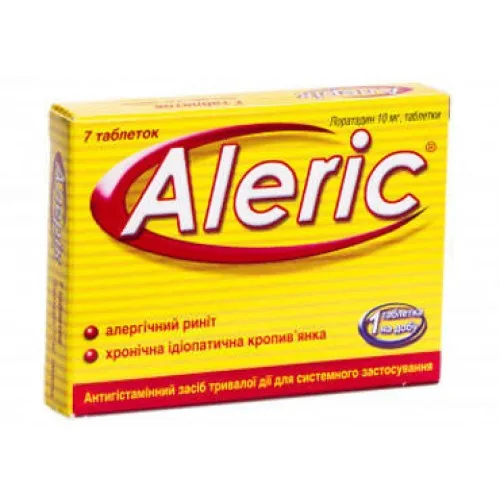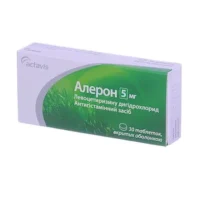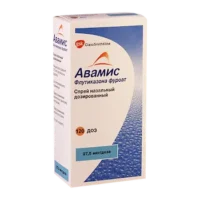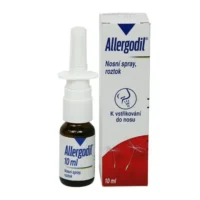Description
Alerik (loratadin) tablets 10 mg. №7
Each tablet of Aleric contains:
- Loratadine – 10 mg
- Additional ingredients including lactose anhydrous
Mechanism of Action
Aleric is an antihistamine medication containing Loratadine, a second-generation antiallergic drug. Loratadine selectively blocks peripheral H1-histamine receptors, exhibiting anti-exudative, antipruritic, and anti-allergic activities. It reduces capillary permeability and has a decongestant effect. The drug’s therapeutic effect usually peaks 8-12 hours post-administration and lasts up to 48 hours.
Loratadine is well absorbed orally, with peak plasma concentration observed 1-2 hours after ingestion. It undergoes hepatic metabolism and is mainly excreted in urine. Loratadine does not accumulate in the body, and its pharmacokinetics are similar in children over 2 years and adults. The drug passes into breast milk.
Pharmacological Properties
Loratadine is metabolized in the liver via the cytochrome P450 system. It has a half-life of 7.5-11 hours and is excreted primarily in urine. The drug does not accumulate in the body even with prolonged use.
Indications for Use
Aleric is indicated for allergic rhinitis (year-round and seasonal), allergic conjunctivitis, chronic idiopathic urticaria, and allergic dermatitis.
Contraindications
Aleric is contraindicated in individuals with hypersensitivity to loratadine or other drug components, galactosemia, glucose-galactose malabsorption syndrome, lactase deficiency, pregnancy, lactation, and children under 2 years old. Caution is advised in severe renal impairment and elderly patients.
Side Effects
Common side effects of Aleric include fatigue, headache, dry mouth, nausea, and drowsiness. Rare adverse reactions may include fainting, heart rhythm disturbances, baldness, liver dysfunction, skin rash, and anaphylaxis.
Usage Instructions
Aleric is for oral use, irrespective of meals. Adults and children over 30 kg should take 10 mg (1 tablet) daily, while children under 12 years and under 30 kg should take 5 mg (1/2 tablet) daily. Therapy duration is typically 10 days, but can be extended based on efficacy and tolerability. Discontinue Aleric 7 days before skin allergy testing.
Benefits Compared to Analogues
Aleric offers effective relief from allergic symptoms with a long-lasting antihistamine effect, minimal CNS penetration, and low risk of sedation compared to some older antihistamines.
Suitable Patient Groups
Aleric is suitable for adults, children over 2 years, and elderly patients. Caution is advised in patients requiring heightened attention concentration.
Storage and Shelf Life
Aleric should be stored in a cool, dry place below 25°C. Protect from light and moisture. The shelf life is typically 2-3 years from the manufacturing date.
Packaging Description
Aleric is typically available in blister packs or plastic bottles, each containing a specific number of tablets.





